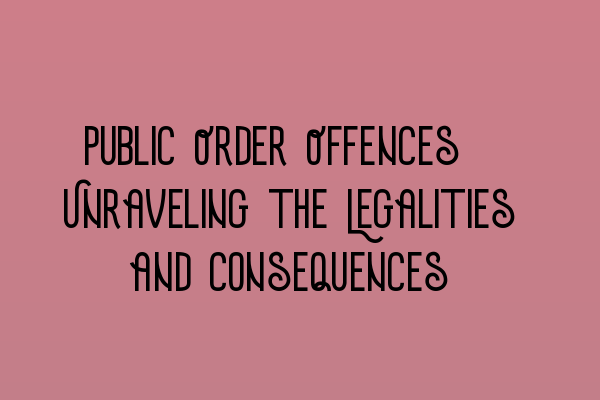Public Order Offences: Unraveling the Legalities and Consequences
Greetings, dear readers! Today, we delve into the intricate world of public order offences. As a leading solicitor at SQE Criminal Law & Practice Law UK, it is my duty to shed light on the legalities and consequences of such offences.
What are Public Order Offences?
Public order offences refer to a wide range of criminal acts that disturb the public peace and cause a breach of order in society. These offences act as safeguards to maintain harmony and protect the rights of individuals in public spaces.
Common examples of public order offences include but are not limited to:
- Disorderly conduct
- Public intoxication
- Rioting
- Incitement to violence
- Threatening behavior
Now, let’s dive deeper into the legalities associated with public order offences.
Legal Framework for Public Order Offences
In the UK, public order offences fall under the umbrella of criminal law. The legal framework surrounding these offences is defined by various acts and legislation.
The Public Order Act 1986 is the primary legislation governing public order offences in England and Wales. It outlines what constitutes a public order offence, the penalties involved, and the procedures followed during arrests and prosecutions.
Additionally, other acts like the Criminal Justice and Public Order Act 1994 and the Anti-social Behaviour, Crime and Policing Act 2014 play significant roles in combating public order offences.
Understanding the legal framework surrounding public order offences is crucial to navigate the complexities of these cases effectively.
Consequences of Public Order Offences
Committing a public order offence can lead to severe consequences. The penalties for such offences vary based on the seriousness of the act, previous convictions, and other aggravating factors.
Common consequences include:
- Fines: Offenders may be required to pay fines as punishment for their actions. The amount of the fine depends on the severity of the offence.
- Imprisonment: In more serious cases, individuals may face imprisonment. The duration of the imprisonment sentence is determined by the court.
- Community Orders: Instead of imprisonment, offenders can be given community orders, which involve completing unpaid work or attending rehabilitation programs.
- Restraining Orders: The court may impose restraining orders to prevent individuals from contacting or approaching certain individuals or locations.
It’s important to note that a conviction for a public order offence can have long-lasting consequences, including damage to one’s reputation and future employment prospects.
We, at SQE Criminal Law & Practice Law UK, strongly advise seeking legal counsel if you find yourself facing public order offence charges. Our team of expert solicitors will guide you through the legal process, ensuring the best possible outcome for your case.
Conclusion
Public order offences carry significant legal ramifications and should not be taken lightly. Understanding the legalities and consequences surrounding these offences is essential to safeguard one’s rights and navigate the legal system effectively.
For more information on related topics, check out our articles:
- SQE 1 Practice Exam Questions
- SQE 1 Practice Mocks FLK1 FLK2
- SQE 2 Preparation Courses
- SQE 1 Preparation Courses
- SRA SQE Exam Dates
Thank you for joining us today. If you have any questions or require legal assistance, do not hesitate to contact SQE Criminal Law & Practice Law UK. Stay informed, stay protected!
